- Home
- Michael Ondaatje
Anil's Ghost Page 9
Anil's Ghost Read online
Page 9
*
The girl would slip into the forest, nocturnal, still as bark, when Palipana died.
She would dress his nakedness with thambili leaves that were part of the decoration for death, sew his last notebooks into his clothes. She had already prepared a pyre for him on the edge of the pokuna, whose sound he loved—and now its flames shivered in the water of the lake. She had already cut one of his phrases into the rock, one of the first things he had said to her, which she had held on to like a raft in her years of fear. She had chiselled it where the horizon of water was, so that, depending on tide and pull of the moon, the words in the rock would submerge or hang above their reflection or be revealed in both elements. Now she stood waist-deep in the water, cutting the Sinhala letters into the dark stone the way he had described the methods of artisans to her. He had once shown her such runes, finding them even in his blindness, and their marginalia of ducks, for eternity. So she carved the outline of ducks on either side of his sentence. In the tank at Kaludiya Pokuna the yard-long sentence still appears and disappears. It has already become an old legend. But the girl who stood waist-deep and cut it into rock in the last week of Palipana’s dying life and carried him into the water beside it and placed his hand against it in the slop of the water was not old. He nodded, remembering the words. And now he would remain by the water and each morning the girl undressed and climbed down against the wall of submerged rock and banged and chiselled, so that in the last days of his life he was accompanied by the great generous noise of her work as if she were speaking out loud. Just the sentence. Not his name or the years of his living, just a gentle sentence once clutched by her, the imprint of it now carried by water around the lake.
He had handed Lakma his old, weathered spectacles, and in the end, after she had sewn his notebooks into his clothing, she would take only this talisman of these glasses with her when she went into the forest.
*
But that night, with the two strangers on the ambalama, the girl could sense the restlessness of Anil, as clear to her as Sarath’s beedi brightening now and then in the dark. Palipana sat up and Lakma knew he would speak, as if there had been no half-hour pause.
‘The man I mentioned, the artist, there was tragedy in his life. Now he works in the gem pits, goes down into them four or five days a week. An arrack drinker, I’ve heard. It is not safe to be with him underground. Maybe he’s still there. He was the craftsman who painted eyes—as his father and grandfather did. An inherited talent, though I think he was the best of the three. I think he’s the one you should find. You will have to pay him.’
Anil said, ‘Pay him for what?’
‘To rebuild the head,’ Sarath murmured in the darkness.
They set out for Colombo the next day, although neither of them wished to leave the spell of the old man and his forest site. They waited for the cool of sundown and left when Palipana and the girl walked towards the ambalama to sleep. An hour south of Matale, the car took a corner and Sarath saw the lights of a truck coming towards them. He braked hard and the car shuddered and skidded on the macadam. Then he saw it was not moving; the truck was parked on the road facing them, its headlights on.
He released the brake and they drifted slowly forward. She had been asleep and now she put her head out the window. There was a man lying on the road in front of the truck. Spread-eagled on his back. The truck was immense above him, the glare of its lights shot beams ahead, but the man was below them in darkness. He was shirtless, his bare feet pointed up saucily, his arms out. Their fear was followed by the humour of it all. Everything was quiet around them as their car crept past. Not even a dog barking. No cicadas. The motor of the truck turned off.
‘Is he the driver?’ She whispered it, not wanting to break the silence.
‘This is how they sometimes sleep, take a short rest. Simply stop in the wrong lane, leave the lights on, and stretch out on the road for half an hour or so. Or he could just be drunk.’
They drove on, Anil now fully awake, leaning with her back to the door so she could face Sarath as he spoke, hardly audible in the wind rushing into the windows. As an archaeologist he always travelled on night roads, more since his wife died, he said. There would be two trips every week—up to Puttalam or to the south coast. He accompanied teams of students puttering along the bunds of prawn farms for ancient village sites or he went to oversee the restoration of a stone bridge in Anuradhapura.
They were just south of Ambepussa and would reach the outskirts of Colombo in an hour. ‘When I was young, my father took bets with us—how many drunks we’d see sleeping by trucks, how many dogs we’d pass. A bonus if we saw a dog with a sleeping man. Or sometimes it would be a group of three or four dogs in the moon shadow of a stilled night truck. He’d bet with us to keep himself awake as he drove. He loved to bet.’
After a long pause Sarath continued. ‘All his life he gambled. We didn’t realize this when we were children. He had an ordered business life, he was a respected lawyer. We were a stable family. But he loved gambling, and our fortunes went up and down.’
‘All you want when you’re a kid is certainty.’
‘Yes.’
‘When you met your wife, you were sure, were you . . . that you were both . . . ?’
‘I knew I loved her. But I was never certain of us, as a pair.’
‘Sarath, can you stop the car, please.’ She heard the slight hollow thump as his right foot slipped away from the accelerator. The car began to slow, not stopping. She was silent, staring ahead into the dark. He veered onto the shoulder and they sat in the dark purring vehicle.
‘You realize there were no dogs back there, by the truck.’
‘Yes. I thought that as soon as I spoke. There was something wrong.’
‘Perhaps it was a village of no dogs. . . . We have to go back.’ She took her eyes off the road and looked at him, and the car jerked loose into a half-circle and drove north again.
. . .
They reached the truck in twenty minutes. The man by the truck was alive but couldn’t move. He was almost unconscious. Someone had hammered a bridge nail into his left palm and another into his right, crucifying him to the tarmac. He was the driver of the truck and as Sarath and Anil approached him a terrified look appeared on his face. As if they were coming back to kill him or torture him further.
She held the man’s face between her hands while Sarath prized the nails from the tarmac, freeing his hands.
‘You have to leave the nails in for now,’ she said. ‘Don’t remove them.’
Sarath explained to the man that she was a doctor. They got a blanket out of the trunk and wrapped him in it and carried him to the back seat. There was nothing to drink besides an inch or two of cordial, which he quickly swallowed.
They were going south again. Every time she turned to see how the man was, his eyes were wide open looking at them. She told Sarath they needed saline solution. She saw a faint light ahead and put her hand on Sarath’s arm to get him to stop. The car pulled over quietly and he shut off the motor.
‘What village is this?’
‘Galapitigama. The village of beautiful women,’ he said, like a refrain. She looked at him. ‘Supposedly. McAlpine said so.’
She climbed out and walked to the door of a house behind which she could see light. She smelled tobacco. Sarath was beside her.
‘We want salt. Hot water. If not hot, then cold will have to do. A small bowl of it—we need to take the bowl with us.’
When the door opened they saw a room busy at knee level. There were seven men around the perimeter, rolling cigarettes, weighing batches of them on scales, packaging them with thin string. Illegal night work. They wore only cotton sarongs in the hot, closed room, which was windowless. Three lamps on the floor where the piles of beedis were stacked up. Everything had a brownness, an orangeness, from the contained weaving flame of the lights. All of the men were in checkered blue-green sarongs.
The bare-chested man who opened the door
stared past them to the car, nervous at their possible authority. Sarath explained that they needed a pot of hot water and salt, then as an afterthought asked for some beedis, if they would be willing to sell them. At which the man laughed.
One of the other men went out through the far door while she and Sarath stood on the threshold, then he returned with salt in one hand and a small bowl in the other. Anil enclosed his wrist with her fingers and turned it so the salt clouded into the water.
This time she got into the back seat beside the truck driver. Sarath said something to him over his shoulder and the man tentatively gave her his left hand. Under the faint roof light Anil soaked a handkerchief in the saline solution and squeezed it onto his palm, the bridge nail still in it. Then the other hand, then back again to the first.
Sarath started the engine.
There were forests on either side of the empty road. The motor’s hum filled the quietness, a thread in this silent world, just her and Sarath and the wounded man. Now and then a village, now and then an unmanned roadblock where they had to slow down and twist through the eye of a needle. As they passed a streetlamp Anil saw that what she was squeezing into his palms was now bloody water. Still she didn’t stop, because the movement kept him calm and awake, kept him from drifting into shock. The mutual gestures—her pull, his giving—were becoming hypnotic to both.
‘What’s your name?’
‘Gunesena.’
‘Do you live near here?’
The man rolled his head slightly, a tactful yes and no, and Anil smiled. In an hour they were within the outskirts of Colombo, and later drove into the compound of Emergency Services.
A Brother
In the operating rooms of the base hospitals in the North Central Province there were always four books in evidence: Hammon’s Analysis of 2,187 Consecutive Penetrating Wounds of the Brain in Vietnam; Gunshot Wounds by Swan and Swan; C. W. Hughes’s Arterial Repair During the Korean War; and Annals of Surgery. Doctors in the midst of an operation would have an orderly turn pages so they could skim the text while continuing surgery. After two weeks of fifteen-hour days they no longer needed assistance from books and moved with ease alongside wounds and suture techniques. But the medical texts remained, for future doctors in training.
In the doctors’ common room in a North Central Province hospital someone had left a copy of Elective Affinities among the other, more porous paperbacks. It remained there throughout the war, unread save by someone who might pick it up while waiting, consider its back-cover description, then replace it respectfully on the table with the others. These—a more popular gang that included Erle Stanley Gardner, Rosemary Rogers, James Hilton and Walter Tevis—were consumed in two or three hours, swallowed like sandwiches on the run. Anything to direct your thoughts away from a war.
The buildings that made up the hospital had been erected at the turn of the century. It had been managed in a lackadaisical way before the exaggeration of war. In the grass courtyard, signs from a more innocent time would last throughout the waves of violence. Half-dead soldiers who wished for sun and fresh air rested there and ate morphine tablets beside a BETEL CHEWING IS PROHIBITED sign.
The victims of ‘intentional violence’ had started appearing in March 1984. They were nearly all male, in their twenties, damaged by mines, grenades, mortar shells. The doctors on duty put down The Queen’s Gambit or The Tea Planter’s Bride and began arresting the haemorrhages. They removed metal and stone from lungs, sutured lacerated chests. In one of the hospital texts that the young doctor Gamini read was a sentence he became excessively fond of: In diagnosing a vascular injury, a high index of suspicion is necessary.
During the first two years of the war more than three hundred casualties were brought in as a result of explosions. Then the weapons improved and the war in the north-central province got worse. The guerrillas had international weaponry smuggled into the country by arms dealers, and they also had homemade bombs.
The doctors saved the lives first, then the limbs. There were mostly grenade injuries. An antipersonnel mine the size of an inkwell would destroy most of a person’s feet. Wherever there was a base hospital in the country, new villages sprang up nearby. There was a need for rehabilitation programmes, and the making of what came to be known as the ‘Jaipur Limb.’ In Europe a new artificial foot cost 2,500 pounds. Here the Jaipur Limb was made for 30 pounds—cheaper because Asian victims could walk without a shoe.
The hospital would run out of painkillers during the first week of any offensive. You were without self in those times, lost among the screaming. You held on to any kind of order—the smell of Savlon antiseptic that was used to wash floors and walls, the ‘children’s injection room’ with its nursery murals. The older purpose of a hospital continued alongside the war. When Gamini finished surgery in the middle of the night, he walked through the compound into the east buildings, where the sick children were. The mothers were always there. Sitting on stools, they rested their upper torso and head on their child’s bed and slept holding the small hands. There were not too many fathers around then. He watched the children, who were unaware of their parents’ arms. Fifty yards away in Emergency he had heard grown men scream for their mothers as they were dying. ‘Wait for me!’ ‘I know you are here!’ This was when he stopped believing in man’s rule on earth. He turned away from every person who stood up for a war. Or the principle of one’s land, or pride of ownership, or even personal rights. All of those motives ended up somehow in the arms of careless power. One was no worse and no better than the enemy. He believed only in the mothers sleeping against their children, the great sexuality of spirit in them, the sexuality of care, so the children would be confident and safe during the night.
Ten beds skirted the edge of the room, and in the centre was a nurse’s desk. Gamini loved the order of these closed wards. If he had a few free hours he avoided the doctors’ dormitory and came here to lie on one of the empty beds, so that even if he could not sleep he was surrounded by something he would find nowhere else in the country. He wanted a mother’s arm to hold him firm on the bed, to lie across his rib cage, to bring a cool washcloth to his face. He would turn to watch a child with jaundice bathed in the pale-blue light as if within a diorama. A blue light that was warm rather than clear, with a specific frequency. ‘Pass me a gentian. Give me a torch.’ Gamini wished to be bathed in it. The nurse looked at her watch and walked from her desk to wake him. But he was not asleep. He drank a cup of tea with her and then left the pediatric ward, which had its own woes. He reached out and touched the small Buddha in the niche of the wall as he passed it.
Crossing the open grass lot, Gamini returned to the war rooms, where there seemed little difference between pre-operative and post-operative patients. The only reasonable constant was that there would be more bodies tomorrow—post-stabbings, post–land mines. Orthopaedic trauma, punctured lungs, spinal cord injuries . . .
A few years earlier a story had gone around about a Colombo doctor—Linus Corea—a neurosurgeon in the private sector. He came from three generations of doctors, the family name was as established as the most permanent banks in the country. Linus Corea was in his late forties when the war broke out. Like most doctors he thought it was madness and unlike most he stayed in private practice; the Prime Minister was one of his clients, as was the leader of the opposition. He had his head massages at Gabriel’s at eight a.m. and saw his patients from nine till two, then golfed with a bodyguard at his side. He dined out, got home before curfew and slept in an air-conditioned room. He had been married for ten years and had two sons. He was a well-liked man; he was polite with everyone because it was the easiest way not to have trouble, to be invisible to those who did not matter to him. This small courtesy created a bubble he rode within. His gestures and politeness disguised an essential lack of interest or, if not that, a lack of time for others on the street. He liked photography. He printed his own pictures in the evening.
In 1987, while he was putting on a golf
green, his bodyguard was shot dead and Dr. Linus Corea was kidnapped. They came out of the woods slowly, unconcerned about being seen by him. It meant it did not matter to them and that frightened him more than anything. He had been alone with the bodyguard. He stood beside the prone body and was surrounded by the men who had shot him from a distance of forty yards precisely through the correct point in the head. No thrashing around.
They spoke to him calmly in a made-up language, which again increased his anxiety. They hit him once and broke a rib to warn him to behave, and then they walked back to their car and drove away with him. For months no one knew where he had got to. The police, the Prime Minister, the head of the Communist Party were called in, and all were outraged. There was no communication from kidnappers wanting payment. It was the Colombo mystery of 1987, and offers of rewards were made throughout the press, none of which was answered.
Eight months after Linus Corea’s disappearance, his wife was alone in the house with their two children when a man came to the door and handed her a letter from her husband. The man stepped inside. The note was simple. It said: If you wish to see me again, come with the children. If you do not wish to, I will understand.
She moved to the phone, and the man produced a gun. She stood there. To her left was a pool where some flowers floated in shallow water. All her valuables were upstairs. She stood there, the children busy in their rooms. It had not been a joyous marriage. Comfortable but not happy. Affections on the thin scale of things. But the letter, while it held his terseness, had a quality she would never have expected. It gave her a choice. It was laconically stated but it was there, graciously, with no strings. Later she thought that if it had not been for that she would not have gone. She muttered to the man. He spoke back to her in an invented language that she did not understand. Some of the news reports at the time of her husband’s disappearance had spoken of UFO kidnappings, and this strangely came to her mind now, there in her front hall.

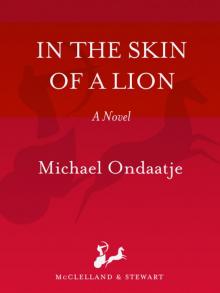 In the Skin of a Lion
In the Skin of a Lion The Cinnamon Peeler
The Cinnamon Peeler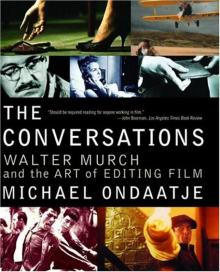 The Conversations: Walter Murch and the Art of Editing Film
The Conversations: Walter Murch and the Art of Editing Film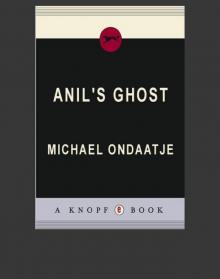 Anil's Ghost
Anil's Ghost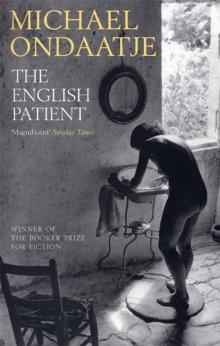 The English Patient
The English Patient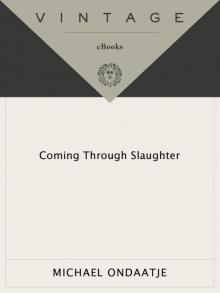 Coming Through Slaughter
Coming Through Slaughter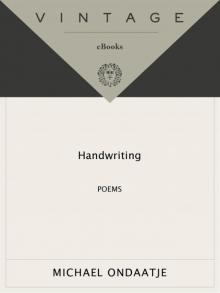 Handwriting
Handwriting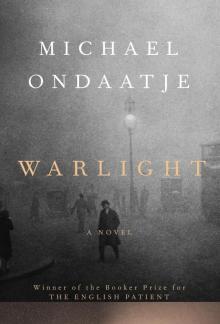 Warlight
Warlight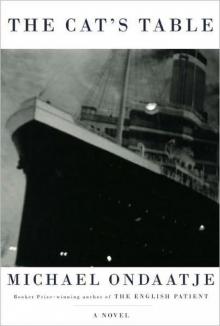 The Cat's Table
The Cat's Table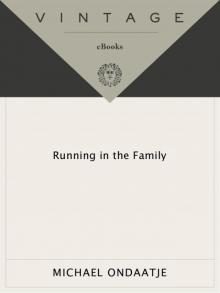 Running in the Family
Running in the Family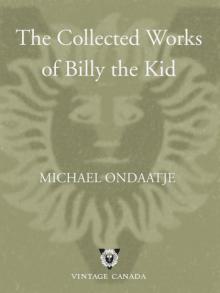 The Collected Works of Billy the Kid
The Collected Works of Billy the Kid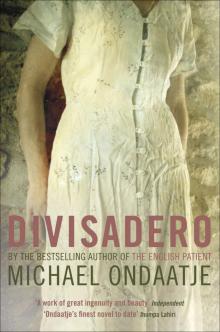 Divisadero
Divisadero